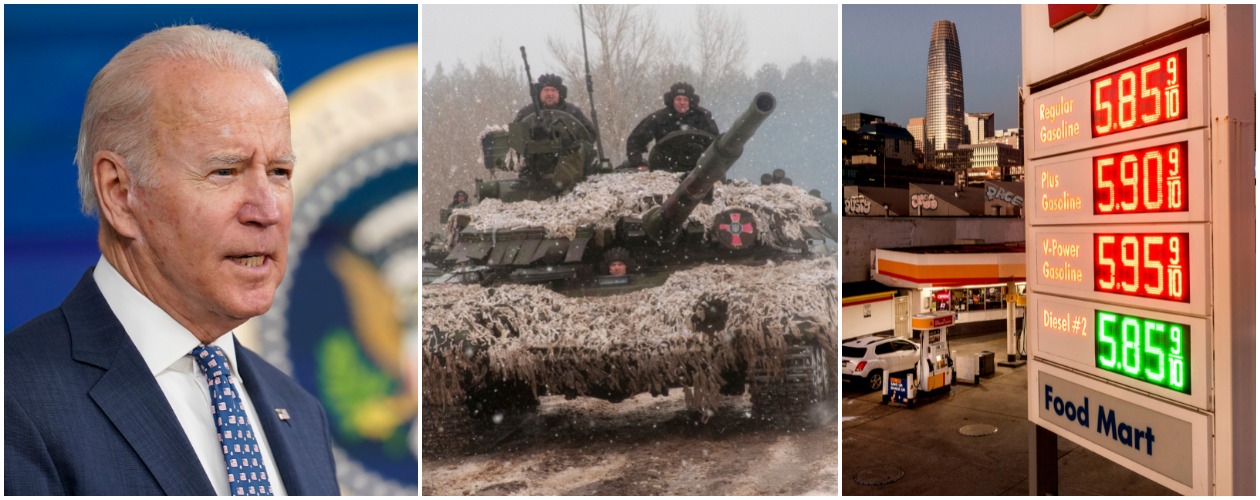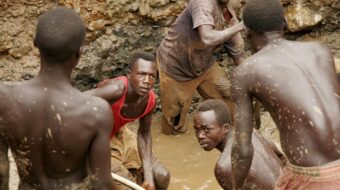
Today, Feb. 16, is the day Americans were told by corporate media last weekend that the Russian invasion of Ukraine could begin. They cited what they called “credible U.S. intelligence reports” indicating that Russia, not waiting for the end of the Winter Olympics, would start its invasion today.
Instead, Ukrainians and Americans woke up Wednesday on the second day of a new Moscow and European peace initiative welcomed by much of the world but greeted with a marked lack of enthusiasm by U.S. officials, from President Joe Biden on down. And rather than declarations from the White House favoring further diplomacy, they got warnings of increased energy prices here at home.
On Monday, the Russian government said diplomatic solutions were “far from exhausted.” Then Tuesday, after a meeting with and standing next to German Chancellor Olaf Scholz, Russian President Vladimir Putin declared: “We intend to and will strive to reach agreement with our partners on the questions that we have posed, in order to solve them by finding a diplomatic path.”

In a speech several hours later, Biden said he supported continued talks but dashed some of the high hopes emanating from moves in Europe by declaring that Russian forces “remain in a threatening position.” Then he repeated the warnings that have been constantly coming from the Pentagon and the White House that the Russian invasion could come any day, including today.
While raising yet another in a seemingly endless series of scares over the Russian troops near Ukraine’s border, Biden said nothing about the more than 125,000 Ukrainian troops lining the borders of the Donetsk and Lugansk People’s Republics in the Donbass region of eastern Ukraine. Those troops, which have killed an estimated 18,000 Russian-speaking Ukrainians in the east, continue to fire on their own fellow Ukrainians there, raising the toll of injured and dead. This is now the eighth year of a situation where the only people killing Ukrainians are other Ukrainians.
Russia, in an attempt to protect millions of Russian-speaking Ukrainians living in the east, has issued Russian passports to them, but that has not stopped Ukrainian military attacks on the population. Along with the official military offensive, ignored by the Western media, there are groups of fascist Ukrainian terrorists, sometimes in small bands, who launch their own attacks against people in the Donbass.
The constant claims by the Biden administration that it is uncovering potential “false flag” attacks being planned by the Russians that could be used to justify an invasion have had the damaging effect of emboldening the right-wing terrorists in the Donbass to attack civilians with impunity—and leaving the Ukrainian government able to always claim such attacks are false flag operations it does not really support.
Putin has characterized the 18,000 deaths in eastern Ukraine as “genocide” against the Russian-speaking population there.
The Communist Party of Donetsk, one of the two “republics” in eastern Ukraine run by the Russian-speaking separatists, issued a strong statement this week charging that “on April 14, 2014, the illegitimate Kiev regime launched an aggressive war against the people of Donbass, who peacefully defended their right to self-determination and safe development. This has led to huge civilian casualties in the region and large-scale destruction of production capacity and infrastructure.
“For the eighth year now, hostilities have not stopped in Donbass. There are signs of an impending full-scale offensive by the Ukrainian side. The West massively supplies Kiev with offensive weapons; the Ukrainian command is constantly strengthening its grouping in Donbass.”
Russia says it is aiming to achieve its key goals—halting NATO expansion and a settlement of the hostilities against the Russian-speaking population in Lugansk and Donetsk—through peaceful means. A war would, of course, benefit neither side.
So far the U.S. has not budged, however, on the key issues which Russia considers a matter of its very survival. There is recognition around the world and even in NATO countries that resolving the current impasse is not something that Russia can be expected to do on its own. At some point, the U.S. has to make a substantial concession. It continues to opt for digging in further rather than negotiating seriously.
The U.S., under the influence of the fossil fuel natural gas and oil industries, is trying to take advantage of the crisis to get Europe to buy expensive energy from the U.S. rather than the cheaper gas they get from Russia. The fossil fuel companies pretend that such a move would help “solve” the current crisis.
Biden on Tuesday, in his speech, actually admitted that Americans could end up paying higher energy costs as a result of the crisis. A solution where Russia, Europe, and the Ukrainian people all benefit with lower prices for consumers is not a solution the energy monopolies back, especially if it does not increase their profits.
Biden reached out to the Russian people in his speech in a manner that went over in Russia like a lead balloon. He said a war would cause “great human suffering” and that the United States and NATO are not a threat to Russia.
Almost everyone in Russia, Putin or anti-Putin, understands clearly the danger of NATO encirclement of their country, and when it comes to the Ukraine crisis, they see the West as primarily responsible. People on the street in Moscow told an MSNBC reporter Wednesday morning that the U.S. should do something about the Ukrainians who are killing Ukrainians rather than blaming Russia. They were referring to the attacks on civilians in eastern Ukraine by the Ukrainian Army and fascist forces.

Western reporters continue to have a hard time finding civilians in Ukraine itself who blame Russia for the crisis. Many people in Kiev interviewed on U.S. television Wednesday said that it was NATO and the U.S. whipping up the crisis and that they were expecting no invasion from Russia.
When a voice blaming Russia can be located, though, they receive repeated attention. For the second day in a row, hot-shot NBC reporter Richard Engel interviewed the same 65-year-old woman, who told him she was “training” so she could shoot Russians if they did invade. Engel told her he couldn’t imagine his own 65-year-old mother in the U.S. doing the same thing. There was no sign of other “trainees” in the area where the interview was conducted. There have been “training” operations videoed by NBC, however, run by the Azov Batallion and other neo-fascist groups.
Back in Washington, Biden incredibly tried to speak for Germany when he said the Germans would cancel the Nord Stream 2 natural gas pipeline if Russia invades Ukraine. German Chancellor Olaf Scholz, however, has given no such assurances in public. In Moscow on Tuesday, Scholz seemed to depart sharply from the tone set by war hawks in the Pentagon.
“We don’t know what happens next and how things will continue,” Scholz said after his three-hour meeting with Putin. “But we can definitely say there are enough starting points for things to develop well.
“Everyone must step back a bit here and make it clear to themselves that we just can’t have a possible military conflict. It is now our task to find a path that is OK for everyone in terms of their own positions and views.”
Earlier Scholz had gotten Ukraine to back off on its insistence that it had to eventually become a member of NATO.
READ FURTHER PEOPLE’S WORLD COVERAGE:
> Pipeline ploy: How U.S. natural gas interests are fueling the Ukraine crisis
> Ukrainian fascists say they will sabotage any peace deal with Russia
> U.S. digs in as many others try to dig out of Ukraine crisis

MOST POPULAR TODAY

High Court essentially bans demonstrations, freedom of assembly in Deep South

Zionist organizations leading campaign to stop ceasefire resolutions in D.C. area

U.S. imperialism’s ‘ironclad’ support for Israel increases fascist danger at home


UN warns that Israel is still blocking humanitarian aid to Gaza






Comments